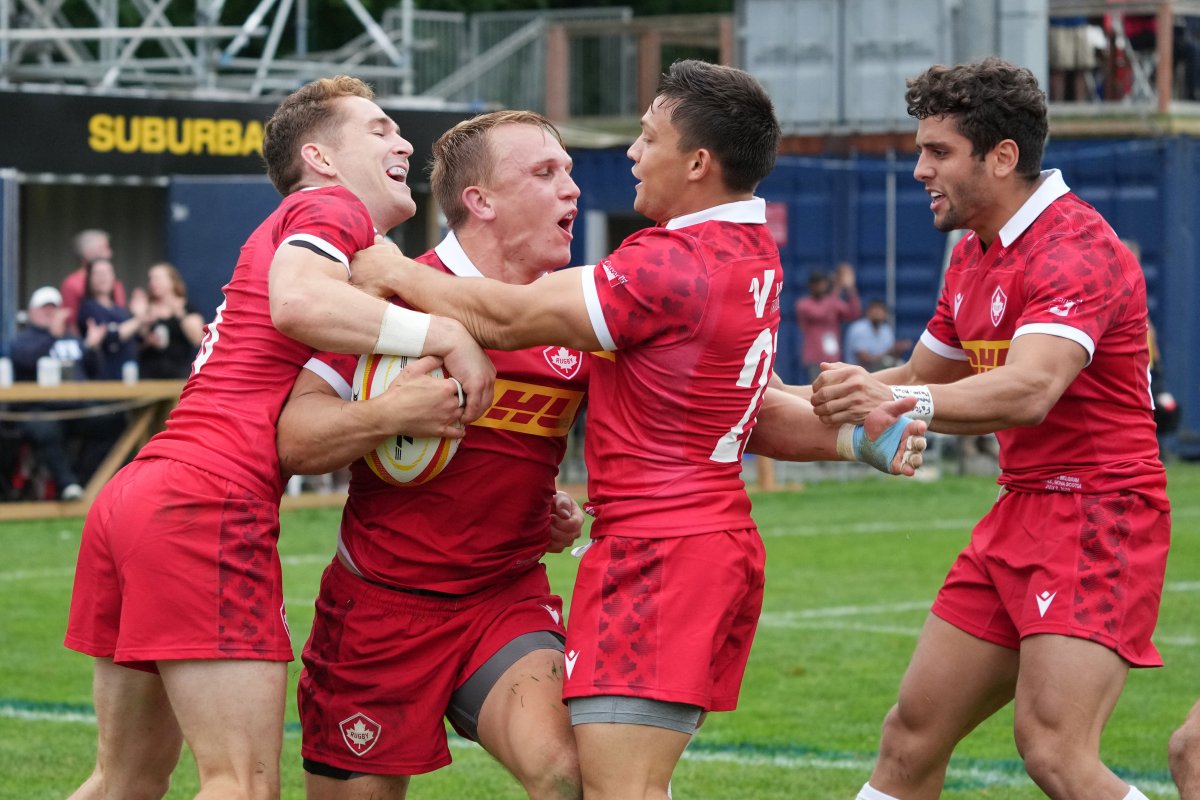Canada’s Ben LeSage has unwittingly found himself in the middle of a raging rugby controversy.

The Canadian co-captain is a victim rather culprit in the story which involves two separate red cards in test matches played some 16,600 kilometres apart. At issue is how the sport polices itself when it comes to dangerous play.
LeSage, a 27-year-old from Calgary who plays his club rugby for the MLR champion New England Free Jacks, was hurt early in the second half of Canada’s 28-3 loss to Tonga on Aug. 9 in the Tongan capital of Nuku’alofa.
After Canada won a scrum, an onrushing LeSage took a pass from teammate Spencer Jones and ran straight into six-foot-one 233-pound Tonga centre George Moala, who picked him up and bundled him hard into the ground.
World Rugby’s Law 9 states “a player must not lift an opponent off the ground and drop or drive that player so that their head and/or upper body make contact with the ground.”
Moala, a former All Black, was sent off. Hurt in the illegal tip-tackle, LeSage was unable to play in the second Tongan test on Monday, which Canada lost 36-12.
On Monday, an independent judicial committee handed Moala a five-game suspension.
In announcing the decision Tuesday, World Rugby said the Tongan player accepted that his actions warranted a red card. That and other mitigating factors caused the committee — consisting of Australia’s Stephen Hardy, former South African player Stefan Terblanche and former international referee Valeriu Toma of Romania — to reduce the mid-range sanction of a 10-match ban by half.
Moala’s ban, which effectively rules him out of next month’s Rugby World Cup, comes in stark contrast to England captain Owen Farrell’s treatment for a red card for a high tackle on Taine Basham in England’s 19-17 win over Wales on Saturday at Twickenham.
Farrell initially was shown a yellow card. But it was upgraded to red upon video review as he sat in the sin bin.
Basham, whose head bore the brunt of Farrell’s right shoulder, failed a subsequent head injury assessment and did not return to the game.
Farrell, who has been sanctioned three times in the past for illegal tackles, had been expected to get a similar ban to Moala.
But a separate independent judicial committee subsequently cleared Farrell, citing mitigation because of the “sudden and significant change in direction from the ball-carrier” caused by England hooker Jamie George pushing Basham just before Farrell slammed into the Welsh forward.
“After careful analysis the judicial committee determined that there was, in this case, mitigating features present to reduce the degree of danger down to a point below the red card test,” according to the ruling.
The three-person committee, consisting of Australian lawyer Adam Casselden and former Wallabies David Croft and John Langford, concluded the decision to upgrade the yellow card to a red was wrong.
“Accordingly, the red card is dismissed and the player is free to resume playing rugby immediately,” said the ruling.
The decision, which means Farrell is cleared to play immediately, seems at odds with a sport that has moved to strengthen concussion protocols and change the laws on tackling to protect players.
And it triggered a wave of negative reaction, especially given the ban on Moala.
“No ban? What a joke,” tweeted Steven Luatua, a former All Black who now represents Samoa.
“George Moala has a clear record and World Rugby has given him 10 weeks for a tip tackle. This guy has had how many red cards and gets off clean? How?” tweeted Pita Ahki, a former New Zealand sevens player who now represents Tonga.
“It was a red card, and there should have been a ban to follow,” former Wales captain Sam Warburton wrote in his column for the Times of London.
“It is, at face value, such a classic example of a dangerously high tackle that an RFU (Rugby Football Union) doctor could present it at a seminar,” wrote Telegraph columnist Oliver Brown. “And it is instigated by a player who, to put politely, has form.”
The RFU governs the sport in England.
World Rugby, the sport’s governing body, announced Thursday that is appealing the Farrell ruling.
“World Rugby fully supports the important role that an independent disciplinary process plays in upholding the integrity and values of the sport, particularly regarding foul play involving head contact,” the governing body said in a statement. “Player welfare is the sport’s No. 1 priority, and the head contact process is central to that mission at the elite level of the sport.
“Having considered the full written decision, World Rugby considers an appeal to be warranted.
The matter now goes before an independent appeal committee.
Canada women’s sevens coach Jack Hanratty says such inconsistency is unwelcome, adding he hopes it doesn’t resurface at the World Cup when the eyes of the world are on the sport.
“As a coach I want to be seen as an expert. And I want to educate my players on the do’s and don’t’s of the game,” he said. “And if there are inconsistencies at the highest level, it’s a major issue.”
The Canadian 15s team was in transit home from Tonga on Thursday.
Farrell, meanwhile, has not been picked for England’s matchday 23 against Ireland in a World Cup warm-up game Saturday.



Comments